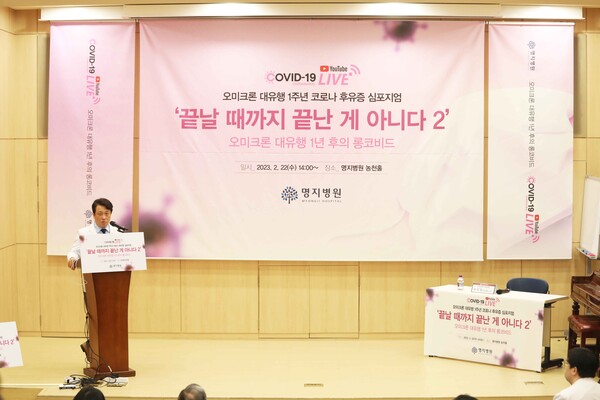Hypoesthesia, one of the aftereffects of Covid-19, also causes neurological aftereffects, such as brain fog (vacancy) and memory loss, a study showed.

Professor Jeong Young-hee of the Neurology Department at Myongji Hospital said so while releasing her analysis of 440 patients who visited the hospital due to Covid-19 aftereffects during a workshop titled “It ain’t over until it’s over” on Wednesday.
“Hypoesthesia might have affected brain fog or memory loss because the olfactory pathway is linked to the limbic system or hippocampus of the brain,” Professor Jeong said. “Besides, as the immune response is activated after Covid-19 infection, it can cause neurological inflammation and cause aftereffects.”
Based on clinical statistics, Jeong said major neurological aftereffects of Covid-19 were brain fog, headache, dizziness, and memory impairment in that order.
“Brain fog, in particular, is deeply related to hypoesthesia and hypogeusia,” she said. “Headache, dizziness, and memory impairment were combined with fatigue and sleep disorders symptoms.”
The hospital organized the symposium to analyze Covid-19 aftereffects and present future treatment direction and outlook based on treatment records and clinical statistics of patients who visited its “Covid-19 Aftereffects Clinic,” which opened in March of last year.
In the first session, Professor Cho Dong-ho of the Department of Infectious Disease said, “Most patients who visited the clinic showed respiratory symptoms, such as coughing, phlegm, and breathing difficulty. In some severe cases, complications, such as lung damage, pulmonary fibrosis, and blood clots, continued due to inflammatory responses.”
Cho went on to say, “As a result of a meta-analysis of the incidence of Covid-19 sequelae, the prevalence rate is high in hospitalized patient groups, women, and Asia. Research is underway at home and abroad to improve complications, but no clear treatment is yet known. Therefore, regardless of declaring the end of the pandemic, the aftereffects treatment system should also be maintained.
Professor Chang Jin-ku of the Neuropsychiatry Department noted that although the virus is likely to penetrate the human body and directly affect the immune system and brain, causing mental illness, the prolonged continuation of Covid-19 and consequent anxiety factors in society and the environment was highly likely to have caused mental illness.
“As a result of the hospital applying high-pressure oxygen treatment to long covid, it improved all neuropsychiatric indicators, including depressed feeling, lowered cognitive impairment, and fatigue,” Chang said. “We will conduct further study on the clinical efficacy and safety of high-pressure oxygen treatment from March after winning approval.”
In the second session, outside experts expressed their views on the outlook of long covid and future research tasks.
“Long covid can appear in various forms regardless of age and severity of the acute disease. Accordingly, a multidisciplinary approach to diagnosis and patient management is important,” said Professor Kim Yun-jeong of the Infectious Disease Department at Kyungpook National University Hospital. “Neuropsychiatric long covid symptoms can be a long-term problem regardless of delta or omicron mutation. Therefore, future research on intestinal microorganisms and vaccines and treatments for long covid patient management is required.”
Professor Choi Jun-yong of the Infectious Disease Department at Severance Hospital said, “As a result of investigating treatment and drug prescription records for one month after diagnosis through the National Health Insurance Service’s big data, patients recovering from Covid-19 had higher complications, such as cardiovascular disease, pneumonia, and acute renal failure, than those not infected.
In addition, he cited as long covid’s risk factors in women, low BMI and white blood cell count after one month of discharge.
“Early studies related to Covid-19 showed a large deviation in the severity of Covid-19 due to a survey that did not consider the number of underlying diseases. They also had limitations as small-scale, single-institution researches due to different definitions of long covid and the Omicron variant,” said Jang Hee-chang, head of the National Infectious Disease Research Institute. "We plan to conduct a representative study that overcomes these problems."
Meanwhile, Myongji Hospital in Goyang, Gyeonggi Province, has published an SCI study in the Journal of Korean Medical Science (JKMS). Its Covid-19 Aftereffect Clinic was introduced nationwide through the EBS documentary, “Great Doctors.”
According to the strategic shift in late January, the hospital also changed its Covid-19 center to a multidisciplinary treatment system focusing on the infectious disease department that mainly deals with long covid. It has been treating long covid patients for six months to one year.

